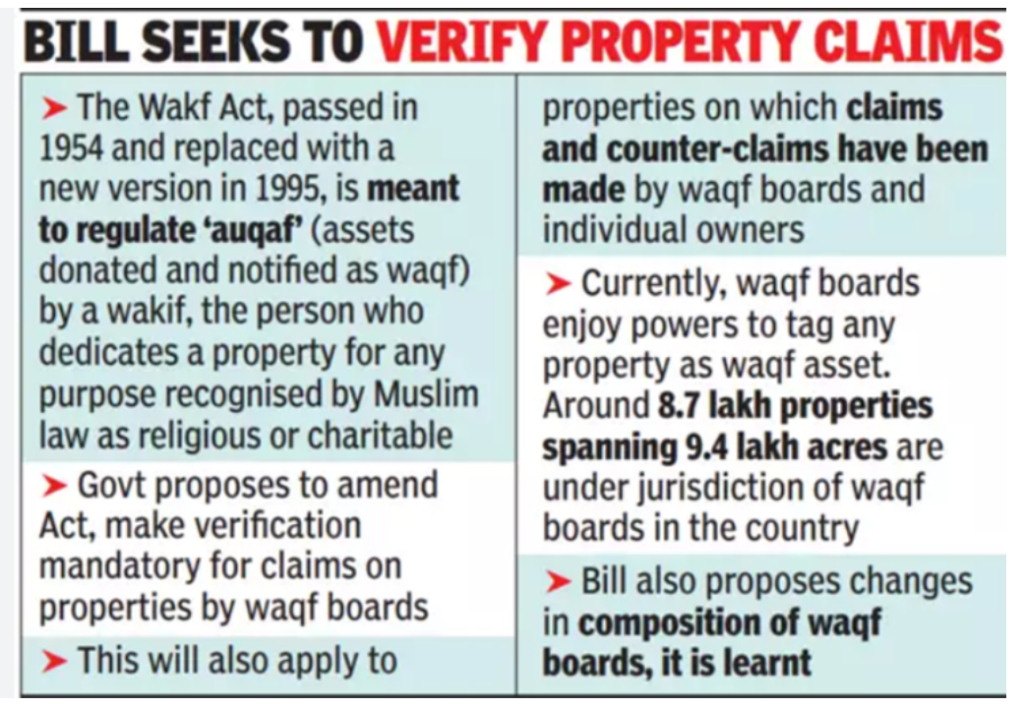Opposition members raise an array of objections to Waqf Amendment Bill
| Topic: GS2 – Indian Polity |
(Source – The Hindu, International Edition – Page No. – 5)
| Context |
| ● The Waqf (Amendment) Bill 2024 has sparked intense debate in Parliament, with opposition parties objecting to excessive government control, non-Muslim board members, and deed record requirements.
● Criticism also includes concerns about the District Collector’s role and insufficient stakeholder consultation. ● The Joint Committee aims to address these issues before the Winter Session. |

Objections Raised by Opposition Parties
- Excessive Government Interference:
- Opposition parties criticised provisions that they believe grant excessive control to the government over Waqf properties.
- Inclusion of Non-Muslim Members:
- There is strong opposition to the inclusion of non-Muslim members in Waqf Boards, arguing it undermines the primary purpose of these boards, which is to manage Waqf properties for the benefit of the Muslim community.
- Deed Records Requirement:
- The requirement to submit “deed records” for Waqf properties has been objected to, with concerns raised about the burden it places on managing and recording these properties.
- Authority Designation:
- Opposition parties are united in their objection to the clause designating the District Collector as the primary authority in determining whether a property is Waqf or government land. They argue this could lead to misclassification and misuse.
- Consultation Process:
- There are complaints about the lack of proper consultation with stakeholders before drafting the Bill, with the argument that the government did not fully consider the Sachar Committee’s recommendations.
- Broad-Basing Membership:
- The broad-basing of Waqf Board membership is contested, as it is seen as misinterpreting recommendations intended to include more community members rather than altering the core composition of the boards.
- Divisive Sub-sects Representation:
- Objections have been raised against provisions allowing representation of specific sub-sects in Waqf Boards, which are viewed as potentially divisive and counterproductive to unified board management.
| Joint Parliamentary Committee (JPC) |
| ● Definition: A Joint Parliamentary Committee (JPC) is an ad-hoc committee set up by both houses of Parliament for specific issues and durations.
● Formation: Established through a motion in one house, agreed to by the other; membership and terms are decided by Parliament. ● Examples: JPCs have been formed for stock market scams (2001) and pesticide residues (2003). ● Functions: Investigate specific issues beyond financial scrutiny, unlike the Public Accounts Committee (PAC). ● Membership: Includes MPs from both Lok Sabha and Rajya Sabha; for example, 30 members for the stock market scam JPC, with varying proportions from each house. ● Effectiveness: Recommendations are persuasive but not binding; the government may choose whether to act on them. ● Comparison with PAC: JPCs can investigate broader issues; PAC focuses on financial scrutiny and audit reports. |
| Practice Question:
Q.1 Analyse the key objections raised against the Waqf (Amendment) Bill 2024. How do these objections reflect broader concerns about governance and minority rights in the context of legislative reforms? (150 Words /10 marks) Q.2 Discuss the significance of Joint Parliamentary Committees (JPCs) in the Indian political system. How do they contribute to effective governance and legislative oversight?(250 Words /15 marks) |
